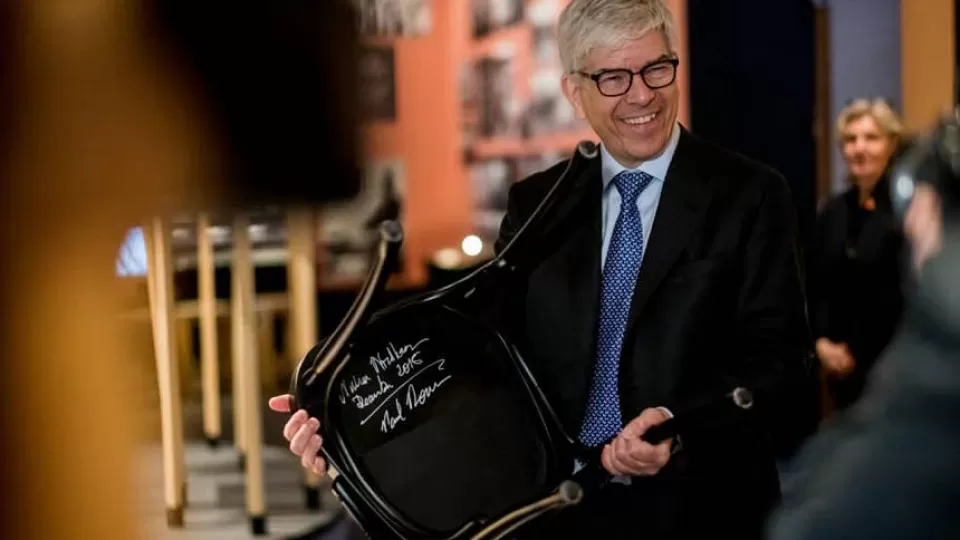September 9, 2022
SINGAPORE – Singapore seems to be doing a better job of protecting its citizens from cyber threats than many bigger developed countries. And Professor Paul Romer, a 2018 Nobel laureate in economics, is on a mission to find out why.
“Israel and Singapore are two of the leaders in the world right now in protecting people and businesses from cybercrime – and I’d like to learn more about the details of how Singapore and Israel are doing that,” said Prof Romer, 66, in an interview with The Straits Times last Friday ahead of the Nobel Prize Dialogue to be held here on Sept 13.
Other areas the world could learn from Singapore include wage policy and urbanisation – fields that Prof Romer, an acclaimed economic theorist, counts among his interests.
“Singapore is very valuable to the world as a kind of a experiment generator that shows the world the kinds of things that are possible, so that we don’t get caught in a very narrow set of beliefs about what’s possible or what’s feasible,” said Prof Romer, who will participate in the dialogue through a pre-recorded discussion with youth from across the Asia-Pacific.
The New York University (NYU) professor in economics and former chief economist of the World Bank won the Nobel Prize for a theory that showed how technological change could result in economic growth.
Describing his research approach, Prof Romer said: “The first thing I find is that, in understanding the complex, noisy reality that we all live in, it’s helpful to identify a few abstractions that let you pull up to a higher level.”
The other element, he added, is to identify and put aside emotional reactions while identifying these abstractions so that one can form potential theories.
His Nobel-winning work typifies this approach.
Recounting the questions he sought to answer, Prof Romer said: “What does it mean to produce an idea and to distribute an idea?
“How does an idea differ from an object, and what’s the essence of the economics of ideas?”
But beyond theory, he also had the applied realm in his sights.
This included a foray into entrepreneurship with education technology company Aplia, which he founded in 2001 while teaching at Stanford.
After selling Aplia in 2007, Prof Romer developed an intense interest in urbanisation, with Singapore as a model for effective urban development.
“Some of Singapore’s insights could be transferable to bring more successful urban development to countries around the world,” he said.
Around the same time, he was appointed to the Ministry of Education’s International Academic Advisory Panel on university policy, which kick started a longstanding association with the Republic, including guest lectures at organisations like the Monetary Authority of Singapore.
“The sustained pattern of interaction from (the panel) really helped me learn more than just the superficial dimensions of Singapore,” he said.
Prof Romer, who has also written about wage growth, also said that he was initially sceptical of Singapore’s Progressive Wage Model, which defies conventional economic wisdom that wages emerge from the interaction of demand and supply.
“So I was inclined to think that this either wouldn’t contribute much or might even be harmful.”
He is now open to its possible effectiveness: “I think that these articulated policies about wages may actually help establish an equilibrium that the society wants, and also sets a standard that the government needs to pay attention to… (by adjusting) the fundamentals of supply and demand.
“For example, if you observed that low-wage workers were not keeping up according to the plan or the vision you’ve articulated, that sends an immediate signal… to increase the demand for low-skilled labour or reduce the supply by training more of low-skilled workers to become high-skilled workers.”
As for what he hopes to talk about during the dialogue, Prof Romer said one topic he wants to cover is the importance of building trust to facilitate cooperation at scale, which is what makes high standards of living possible.
The other is a more sophisticated understanding of the role of the government, beyond simplistic rhetoric about the pitfalls of government intervention from some economists, which, he said, has contributed to many countries not having governments that can do their jobs well. “So I feel like it’s part of my job to do some damage control and to refocus that conversation.”
Bio
Professor Paul Romer, 66, a native of Denver, Colorado, is currently a professor in economics at New York University.
Prof Romer also served as chief economist at the World Bank from 2016 to 2018.
He previously worked at the universities of Rochester, Chicago, California, Berkeley, and Stanford University.
He received his education at the University of Chicago, where he gained a doctorate in 1983, Massachusetts Institute of Technology, and Queen’s University in Kingston, Ontario, Canada.
In 2018, he won the Sveriges Riksbank Prize in Economic Sciences in Memory of Alfred Nobel for integrating technological innovations into long-run macroeconomic analysis.
Previously an avid pilot when living in California, Prof Romer, who is married with two children, now learns and codes in programming language Python as a hobby.
Event details
What: Nobel Prize Dialogue Singapore
Young people from across the Asia-Pacific, together with Nobel Prize laureates and international experts, will take part in a series of conversations exploring the best path to a world with improved well-being for all.
When: Sept 13
How: Register
To follow the proceedings, register here:
In partnership with the Nobel Prize Dialogue 2022 and NUS Yong Loo Lin School of Medicine.


